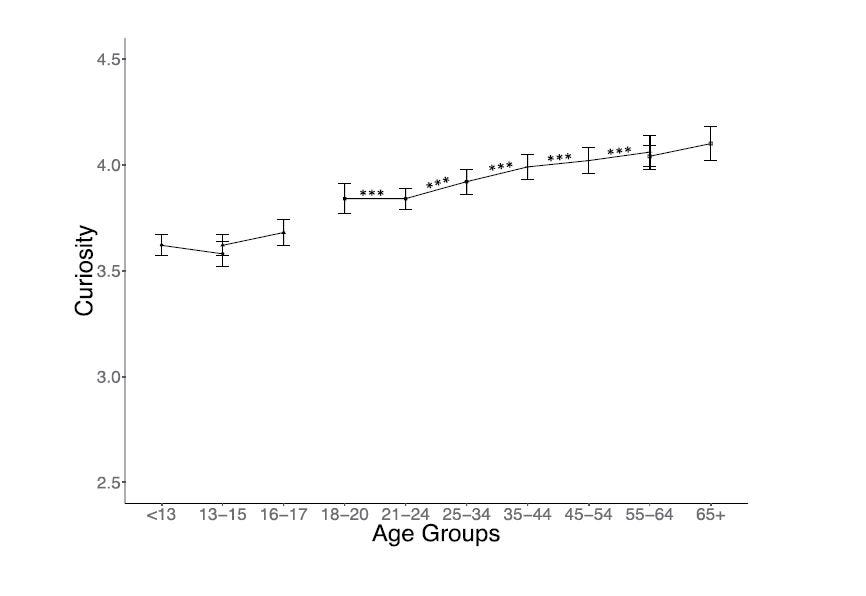Correcting a Misunderstanding About Curiosity
The Science of how curiosity changes as we age
Humans often experience malicious pleasure when others fall prey to misinformation - moments of schadenfreude. We feel shrewd and wise in comparison. It’s quaint to believe we are smart enough to avoid informational scams. But in a world of excess information, none of us have sufficient time for the necessary background checks.
As someone spending decades researching curiosity, I am struck by the number of articles and books that repeat a maxim that kids are more curious than adults. Best-selling authors Po Bronson and Ashley Merryman pronounce:
Preschool children, on average, ask their parents about 100 questions a day. Why, why, why—sometimes parents just wish it'd stop. Tragically, it does stop. By middle school they've pretty much stopped asking. It's no coincidence that this same time is when student motivation and engagement plummet. They didn't stop asking questions because they lost interest: it's the other way around. They lost interest because they stopped asking questions.
In his best-selling book, A More Beautiful Question, Warren Berger claims:
Preschoolers are still asking questions at a higher rate than older schoolkids.
Online, you’ll (ironically) find adults wondering:
“Why do we lose our childhood curiosity as adults?”
“Why aren’t adults as curious as children?”
“Why do adults stop being curious?”
Whether adults are less curious than younger adults and kids is a testable question. If a statement is testable, then it should be expressed as a hypothesis or the evidence should be laid out for audiences.
Trust the Science
The latest study that rocked my world asked the question of whether curiosity does in fact decline over the lifespan, from kids to old age? A couple of fine folks from Switzerland sifted through 47 separate studies with 1,098,748 research participants to uncover an answer.

The answer is no. Adults are not a monolithic sea of incurious characters. Quite the opposite. Young adults aged 18-20 expressed greater curiosity than teenagers and kids under the age of 13. Perhaps surprisingly, curiosity keeps increasing as those young adults age until leveling off upon hitting old age.
Repetition does not make an idea more factual. Even when verbalized by your favorite authors, journalists, and scientists.
Why Do Adults Gain Curiosity?
Something not even remotely magical happens as you explore new terrain and learn something new. You generate new thoughts and questions.
I remember the first time a personal trainer told me that my muscularity plateaued because I’ve been using the same dumbbell and barbell workout routines since 8th grade. He introduced me to the wacky world of battle ropes. He showed me the proper form for creating waves.
Shoulder width apart, bent in a squat position, hold a rope in each hand, and raise and lower them explosively. Master this routine and you wonder: What happens if I add jumps? What happens if I add a bosu ball? What happens if I start in the plank position? How can I build up my cardiovascular system to last longer? How can I strengthen my hand grip to last longer? How can I design it to improve lateral movements in my pickleball game? As you gain knowledge and skill, you get better at inventing personalized exercises.
Age is not what inhibits curiosity. A lack of interests, a lack of motivation in learning, a lack of humility, a lack of self-efficacy, and a lack of autonomy are what disable curiosity.1
Provocation
Do not assume that someone’s statement is accurate just because they have alphabet soup listed after their name or a huge social media following. Say the thing you are not supposed to say - I like you, I trust you, and yet, can you show me the evidence? Train yourself to seek behavioral evidence. Train the children to do the same.
If you enjoyed this newsletter, please leave a ❤️. Even better, share this conversation. And if you read The Art of Insubordination (with tools and strategies for Principled Dissent), send me thoughts, questions, or beefs. I love hearing from readers.
………………………………………………………………………………..
Extra Curiosities
The LISTEN - There is a deficit in courage in organizations, where people are unwilling to deviate from wrong-headed directions. They are afraid to say things that might lead to censure. Listen to my conversation with @Kwame Christian as we talked about this on his Negotiate Anything podcast. Damn did we laugh and connect - Let me know what you think.
This is just a starter set of psycho-social and environmental variables that inhibit curiosity. Just as you shouldn’t assume older adults are less curious than kids, don’t assume that inadequate financial resources or socioeconomic status disqualify someone from being extremely curious. Check out the killer research of Dr. Prachi Shah.



